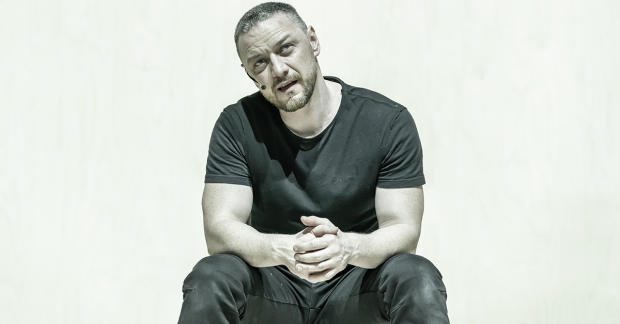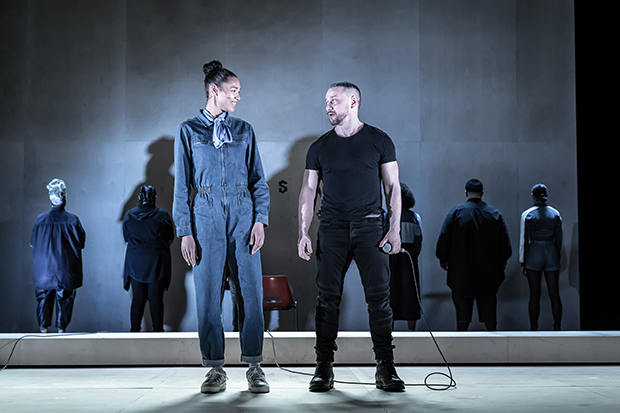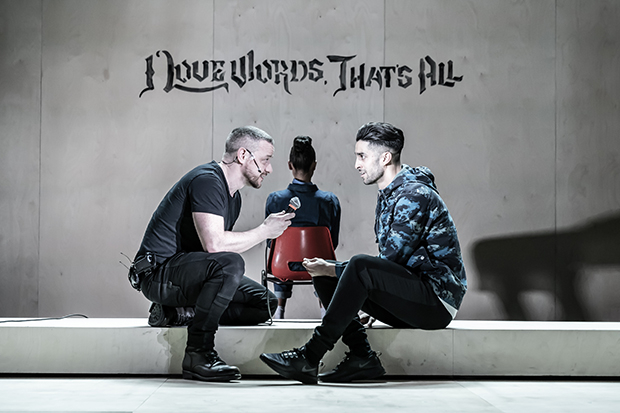Review: James McAvoy as the Hottest Cyrano You'll Ever See

(© Marc Brenner)
As Peter Dinklage showed us just a few years ago (and more recently on screen), one needs not don the long, protuberant, fake nose to convincingly portray Edmund Rostand's beloved tragic hero Cyrano de Bergerac. What matters most (for this play, anyway) is the actor's ability to rip the hearts out of our chests and show them to us through his sheer command of language. His élan is always more important than his schnoz — and I've always been sidetracked by the mechanics of the prosthetics, anyway.
James McAvoy is the latest performer to go without the false proboscis, and with good reason: Why distract the audience from the hottest Cyrano they'll ever see? It's one of many deconstructions in Jamie Lloyd's electrifying new take of the classic, now running a victory lap at Brooklyn Academy of Music after two hit engagements in London's West End. Using a new translation by Martin Crimp that faithfully transforms Rostand's romantic verses into slam poetry (complete with beatboxer), this erotically charged Cyrano de Bergerac is a titillating thrill from start to finish, and my favorite of all the Cyrano's I've seen, by much more than just a nose.
The setting is 1640s France by way of an empty wooden box; the costumes are straight out of Fort Greene circa 2022 (Soutra Gilmour, Lloyd's longtime design collaborator, did both, further enhancing the ultra-minimalist aesthetic they displayed on Broadway in Betrayal). Crimp's language is just as fresh, while still breathing like the original. At the heart is a love triangle between the title soldier (McAvoy), whose wit and dagger skills are both rapier-sharp, to cover his low self-esteem; his cousin and secret love, Roxane (Evelyn Miller); and the object of her affection, a dimwitted young cadet named Christian (Eben Figueiredo). Cyrano helps Christian woo Roxane by providing reams of letters, but is secretly wooing her himself, and you probably already know what happens next. As Crimp puts it in an inspired aside to the audience, "Trust me, this will work. I've seen it in the film with Steve Martin."

(© Marc Brenner)
That wooing scene usually takes place on a moonlit night with Roxane on a balcony and Christian and Cyrano hiding under the trellises. In Lloyd's muscular and magnificent hands, it becomes a game of musical chairs as Roxane and Christian dance around their affection, leaving it to Cyrano to finish the seduction. "I'm undressing you, I'm looking into your eyes, I'm kissing your eyes, I'm pressing you against a wall, you're pushing back, you're pushing back, your body wants mine, you kiss my mouth, you bite my lip, you draw blood, you're on fire, your eyes are flame, your hair is flame, the whole world shimmers and I burn and I burn with love," McAvoy says in a near whisper as his Cyrano simultaneously makes the entire audience cross their legs and shiver.
McAvoy's entire performance (done in his native Glaswegian dialect) has that quality: you want him to want you. That it's entirely in keeping with the text is a testament to both his mastery as an actor and Lloyd's as a director, and this brilliant mixture of celebrity star power, sex appeal, command of language, and just damn good acting will make you fall in love with the power of words all over again.
He's equally matched by Miller, who's every bit as good as a deeper, more conflicted Roxane than we're used to. She's no longer the meat in the Cyrano/Christian sandwich, but a woman trying to make her way in a male-dominated world, one who knows what she has to do to get by even if she doesn't like it, and even if it involves a lech like the hoity-toity De Guiche (the expertly despicable Tom Edden). Figueiredo makes for a compelling Christian and does well in a tricky part that's made even thornier by Crimp, whose one authorial fault comes in the second half as he revises a 125-year-old plot element that didn't really need adjusting. It does give the audience something else to squirm about though, and maybe that was the point.
This is the second production of Cyrano de Bergerac that I've seen Lloyd direct and Gilmour design. Their first, in 2012, was a swashbuckling period dress affair that starred Douglas Hodge, his bulbous falsie, and an earthbound translation that turned derring-do into derring don't. With Crimp and McAvoy as their collaborators, and an inherent trust that the power of words — beautifully delivered — can create as stunning a stage picture as a vast set and flashy costumes, Lloyd and Gilmour have built the ideal Cyrano de Bergerac, a small miracle in the middle of Brooklyn.

(© Marc Brenner)










